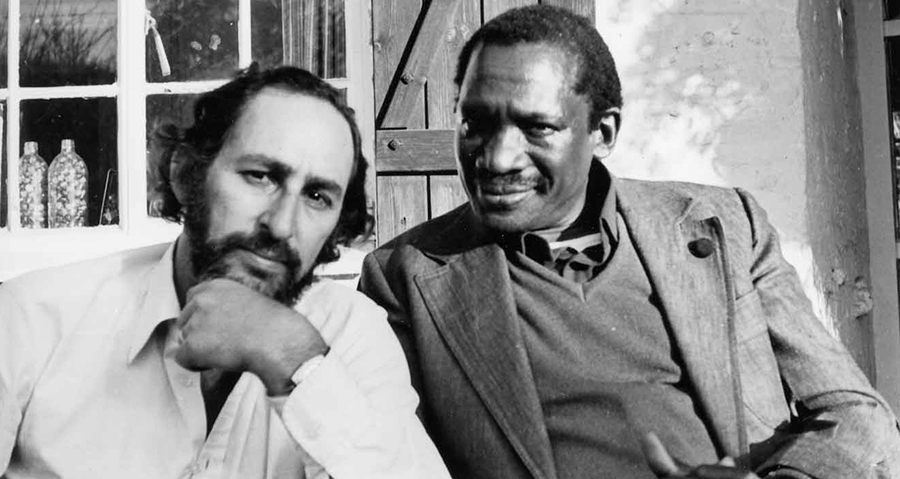Israel in the Letters of Benjamin Pogrund and Robert Sobukwe – a web exhibition by Emma Frieda Daitz

The purpose of this exhibition is to give interested readers a taste of the correspondence between Robert Sobukwe and Benjamin Pogrund from 1960 to 1969. The letters I have selected here were chosen with an audience interested in Jewish Studies in mind. Although they cover a range of topics, they are linked by an ongoing discussion between Pogrund and Sobukwe about Israel and the plight of “Arabs” made refugees by the formation of the Jewish state. Pogrund and Sobukwe were not entirely of one mind on this issue and the letters are fascinating in terms of how they negotiate their disagreement. The correspondence is the focus of my doctoral dissertation: ““Speaking as one African to another”: Friendship in the Letters of Robert Sobukwe and Benjamin Pogrund”, which explores, among other things, the relationship between friendship and politics.
Robert Sobukwe was among a group of Africanists who broke from the African National Congress in 1958 to form the Pan Africanist Congress (PAC). In 1960, he was arrested and sentenced to three years hard labour for inciting Africans to break the pass laws as part of the PAC’s anti-pass campaign. In 1963, parliament amended the Suppression of Communism Act, giving the Minister of Justice the prerogative to prolong the detention of political prisoners indefinitely. Sobukwe was transferred to Robben Island and spent a further six years in solitary confinement. He was then banished to the mining town of Kimberley, his movements and speech proscribed by a banning order. In 1978, he died of lung cancer. [1] Pogrund was a Jewish journalist at the Rand Daily Mail, a liberal English language newspaper with a national readership. His journalistic focus was “Black politics”. Pogrund was a liberal and was actively involved in various circles of opposition to apartheid. Sobukwe and Pogrund met by chance at the University of the Witwatersrand (Wits) where Sobukwe was a lecturer in the late 1950s. The two became close friends, referring to one another in their letters as “brother”. [2] In 1997, Pogrund presented his correspondence with Sobukwe, together with other correspondence written by Sobukwe and concerning him, to the Wits Historical Papers Research Archive. In the same year, he emigrated to Israel. He currently lives in Jerusalem.
There are several ways in which Pogrund and Sobukwe’s letters might be of interest to us today. Firstly, the letters provide a rich and detailed portrait of friendship and intimacy between two male figures from the anti-apartheid struggle that is against type. Neither the regime’s account of itself nor the historiography of the anti-apartheid struggle has paid much attention to non-hegemonic forms of masculinity or to the domestic lives of men. These letters offer us a view of these neglected areas of concern. Secondly, the letters offer a more ambiguous picture of social and affective relations across ‘race’ in the midst of the struggle against apartheid. Thirdly, the letters are exchanged between two people with ideological and political convictions that we think of today as radically incommensurable – Pogrund was a liberal, Sobukwe a pan-Africanist – thus inviting us, at a moment when it seems apposite, to think about the more complicated relationship between the stated ideological commitments of social actors and their always more complex personal lives and affections.
The letters are reproduced here with the kind permission of the University of the Witwatersrand’s Historical Papers Research Archive who hold the complete Pogrund-Sobukwe correspondence as part of the Robert Sobukwe Papers. The Robert Sobukwe Papers are fully digitised and available to view and download at http://www.historicalpapers.wits.ac.za/index.php?inventory/U/collections&c=A2618/R/6325. An edited volume of the letters has also recently been published by Derek Hook, titled Lie on Your Wounds: The Prison Correspondence of Robert Mangaliso Sobukwe (2019).
All footnotes to the letters are the product of my own research unless otherwise noted. I have relied in some instances on Hook’s volume and, where this is the case, his work is acknowledged as per the usual academic conventions.
Letters
[1] For a full account see Benjamine Pogrund, How Can Man Die Better: The Life of Robert Sobukwe (Jeppestown: Jonathan Ball Publishers, 1990).
[2] See, for example, correspondence from Benjamin Pogrund to Robert Sobukwe, 25 June, 1968, A2618. Ba6.32, Robert Sobukwe Papers, Historical Papers Research Archive, University of the Witwatersrand, Johannesburg, South Africa (hereafter Robert Sobukwe Papers).
